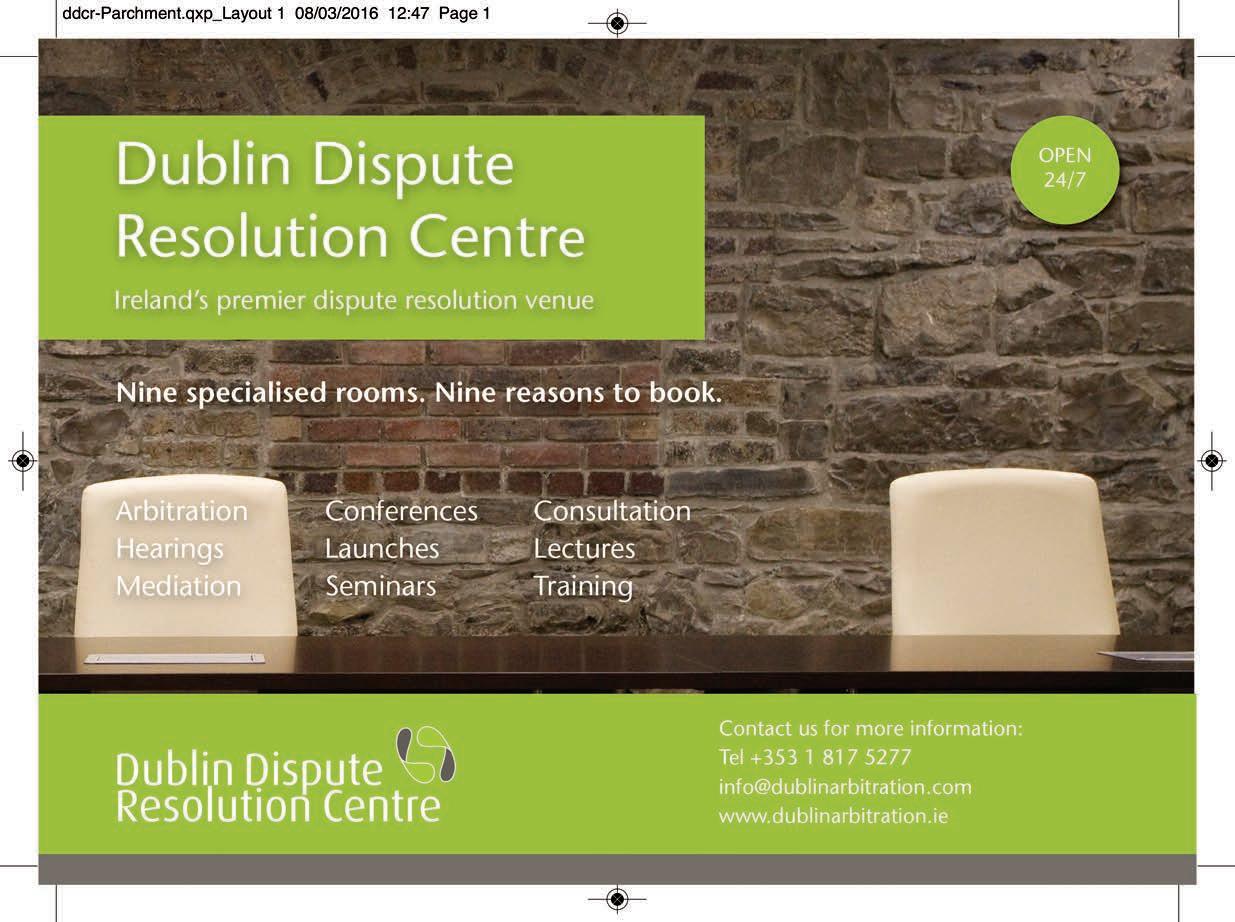
9 minute read
Advices on Professional Indemnity Renewal
by 256 Content
For many the 2019/2020 Professional Indemnity Insurance Renewal season came as something of a shock. The Professional Indemnity Insurance Taskforce of the DSBA sets out some advices on the upcoming renewal process
Notwithstanding that the amount of claims for solicitors had been relatively modest prior to the renewal period, the insurance industry decided to impose upon many members of the profession substantial increases on their premiums.
Advertisement
Background Since 1994, the obtaining of Professional Indemnity Insurances has been mandatory for all solicitors and even where historically it wasn’t mandatory many firms, if not all, would have maintained some form of Professional Indemnity Insurance.
In 1994, of course, the world was a different place in many respects – not least because we had the Solicitors Mutual Defence Fund in the market at that time. While things ended badly for that Fund, nonetheless for many years it operated successfully and helped to keep premiums at a low and sustainable level.
The recession which struck us all finished the Mutual Defence Fund and indeed members of the profession had to step in to assist those colleagues who were insured with the Mutual Defence Fund to make sure that they were covered by way of an annual subscription for a number of years to the Law Society to back up the Fund.
As we headed into the recession there were still however a good number of insurance companies in the market and indeed many members during the recession availed of the existence of not just rated but unrated insurers in the market who met the criteria such as for example UK General.
The unrated insurers left the market subsequently and cannot now return as the Law Society restricted the market to rated insurers.
With the ending of the recession we began to see a whittling down over a period of time of the number of insurers who were actually operating in the Irish market and by September of 2019 there were only six insurers in the Irish market.
Current Position It needs to be understood that not all insurers cover all firms.
In 2019, of the six insurers in the market, two of them would only cover Partnerships and the remaining four – while they would take sole Practitioners and Partnerships – would be selective in relation to the nature of the work that they would cover. For example, some firms would only insure practices where the property element of their turnover was less than 25% of their overall turnover.
What this all means of course is that when we got to September of 2019, the profession was suddenly faced with a relatively small number of insurers in the market many of whom saw fit to increase premiums across the board.
The mood music from the Law Society, who are one of the two regulators responsible for dealing with insurance, is not good and while there is talk
The members of the DSBA Professional Indemnity Taskforce committee are Niall Cawley, Killian O’Reilly and Avril Mangan
of trying to persuade other insurers to come to the market right now, things are looking difficult and by implication perhaps more difficult than last year.
The system operates in such a way that the UK is the primary market for our insurers and they tend to deal with the legal profession’s needs in the UK first and only focus on us once that market closes out so that effectively they start dealing with us in September, October and into November of each year.
The Assigned Risks Pool The situation is underlined by the fact that the Assigned Risks Pool, we understand, currently has 57 firms in it.
For most of you, I would hope the Assigned Risks Pool is something that you might have heard of but have not become personally involved in. In essence the Assigned Risks Pool is the insurer of last resort for solicitors who cannot get insurance in the market. The problem with the Assigned Risks Pool firstly is that the premium is substantially higher than the market would otherwise offer (we appreciate the paradox) but also it is a one year deal only.
What that means is that if you have not come out of the Assigned Risks Pool and gone back into the insurance market (i.e. if you have not been able to obtain cover) then you cannot remain in the Assigned Risks Pool and in essence you must cease practising. In other words, the consequences of entering into the Assigned Risks Pool and failing to come out of it
couldn’t be more serious from a practice’s point of view.
Change There is no doubt that the system that we are currently living with, and operating in, is failing us and is in need of urgent attention.
The DSBA Council has requested that proposals be prepared for the purposes of submission to the regulators suggesting changes that can be brought about and these will be dealt with on a later date once those proposals are finalised. Advices on Renewal Process The purposes of this article is to offer such advices as are available at this time to colleagues dealing with the reality on the ground. That is to say, we have a renewal coming up and we have to deal with it as it is at the moment as any changes to the whole system of Professional Indemnity Insurance are only changes to be made in the medium to long term.
With that in mind therefore, we are making the following recommendations to you in the hope that they may be of some assistance:-
1. Prepare your Application early
We know this is constantly being said but leaving your application until the last minute leaves you exposed to having to accept whatever terms you are offered. None of us are particularly enamoured
The consequences of entering into the Assigned Risks Pool and failing to come out of it couldn’t be more serious from a practise’s point of view
about the idea of preparing the application for Insurance but it is something that needs attention early on and certainly, by mid to late October, your application should be in.
2. The Common Proposal Form
The Law Society negotiates annually the Common
Proposal Form with the insurance industry. The purpose of the Common Proposal Form and the reason that it was introduced is to relieve you from the task of having to fill out different Proposal
Forms.
We are strongly recommending that you use the
Common Proposal Form. You will be able to obtain same from the Law Society’s website and you should use it.
One new area that you might want to consider is the control systems that you have now put in place for those of you working remotely so that you can satisfy your insurer that you have adequate supervision systems in place.
Thus we recommend that you AVOID using the
Short Form which is often offered by insurance companies.
The reasons for this are as follows:a. Even where your insurance premium is satisfactory, having used the insurance company’s short form, sooner or later you will have to use the Common Proposal Form. As this writer has discovered, an insurer who is happy with your short form for many years will eventually decide that they want the Common Proposal Form (or a long form) completed. The problem with that of course is that the amount of information that you have to collate on an annual basis will be multiplied by the number of years that you have not done it. We would strongly advise therefore that you complete the Common Proposal Form for that reason. b. If you use the short form, then you are sending a signal to the insurer you are asking a quote from that theirs is the only company that you have gone to. They are therefore aware by implication that you have not completed the Common
Proposal Form and that no other insurers are on the field vis a vis yourself. If you find yourself with the short form having gone in, and a large quote coming out to you at the last minute, you are in a very weak position. c. Using the Common Proposal Form means that you are now free to send your Proposal Form to as many insurers as you want and frankly we would suggest that you send it to all of the insurers.
Long Term Relationship It has often been suggested to us that retaining a long term relationship with your insurer is to your advantage and certainly that does appear to make sense. However, what we have seen is that insurers feel free, notwithstanding your long term loyalty to them, to increase your premiums and they also feel free when it suits them to withdraw from the market and leave you high and dry.
For that reason therefore we strongly recommend that you approach all insurance companies in the market.
Brokers Check with your broker, if you are using one, as to what firms they work with. There is no point in sending a Proposal Form to a company that is already represented by the broker that you have retained to look after your interests.
This avoids your broker being informed that a proposal has been submitted by you separately.
You are hoping, if you have a good broker, that he or she will go to bat for you and certainly they would be undermined in that respect if the insurance company was telling them that they received a separate proposal whether from another broker or directly from you so make sure you avoid that particular pitfall.
The Current Insurers At time of preparation of this article the following insurers were in the market:1. AIG. 2. Allianz. 3. CAN. 4. Liberty. 5. QBE. 6. Starr.
Some insurers, as we referenced earlier, will only cover certain type of firms but frankly, if you prepare a Common Proposal Form our recommendation is that you ensure that it is submitted to all insurers either via your broker or directly.
Summary To Summarise therefore we would in simple terms advise as follows:1. Prepare your proposal early. 2. Use the Common Proposal Form. 3. Ensure that there is no duplication on your proposals by speaking to your broker. 4. Send it to all of the Insurers currently operating in the market even if some insurers won’t cover your kind of practice lest their position changes.
In closing it should be noted that while we have indicated above who the currently six insurers are, check at the time that you are submitting.
The Law Society has indicated that it hopes that further insurers will come into the market. There is no guarantee of this but if it does happen, needless to say, be sure that you get your Proposal Form out to them as well especially if they are new into the market as they may be keen to do business.
In any event, we hope that the above is of assistance to you. The DSBA intends to make proposals to its Regulators (the LSRA and the Law Society) with regard to the current operation of the Professional Indemnity Insurance system in the Republic of Ireland and those submissions will be prepared and submitted at a later date.














